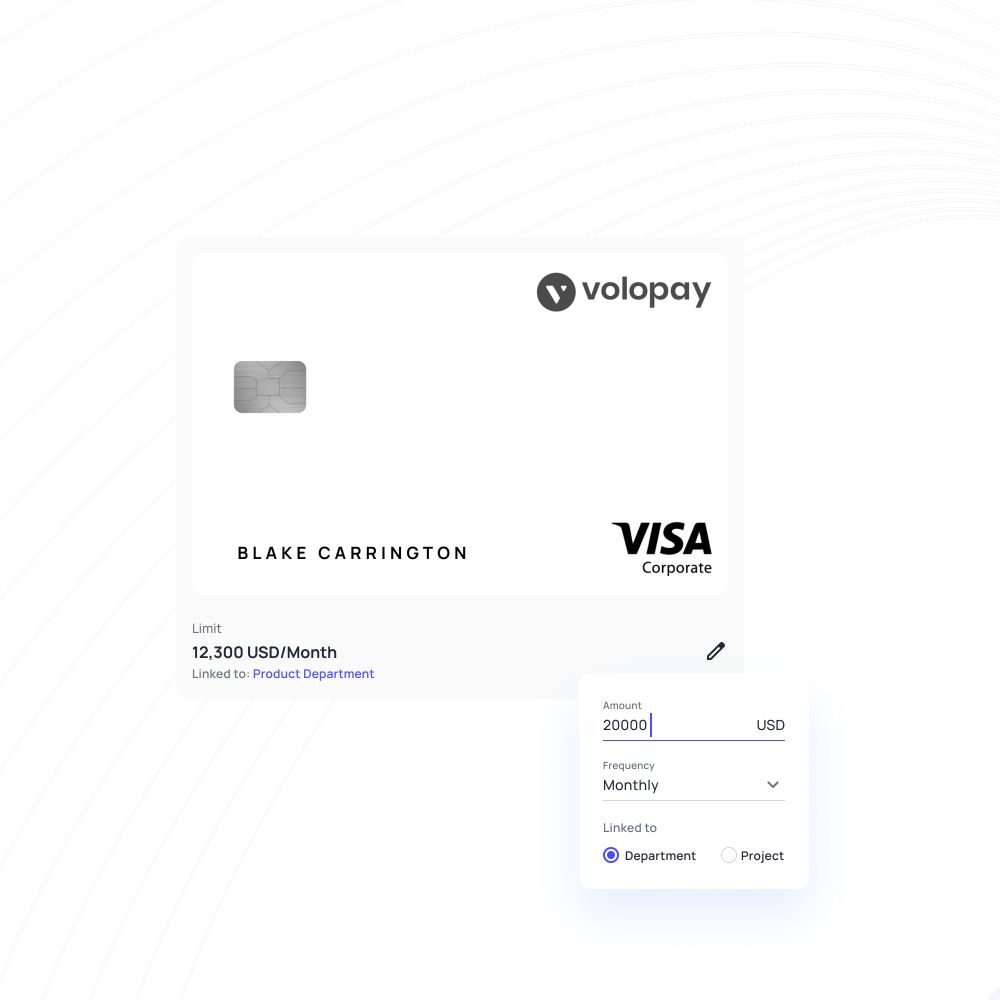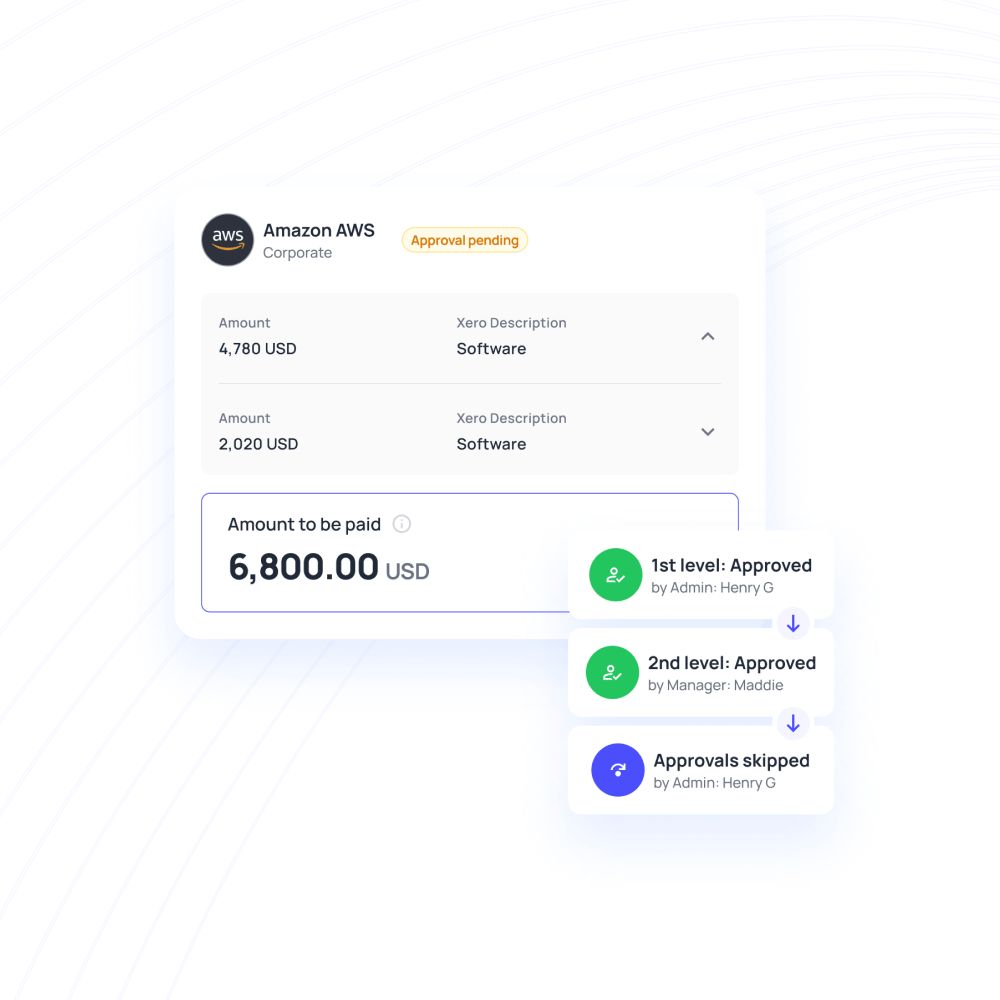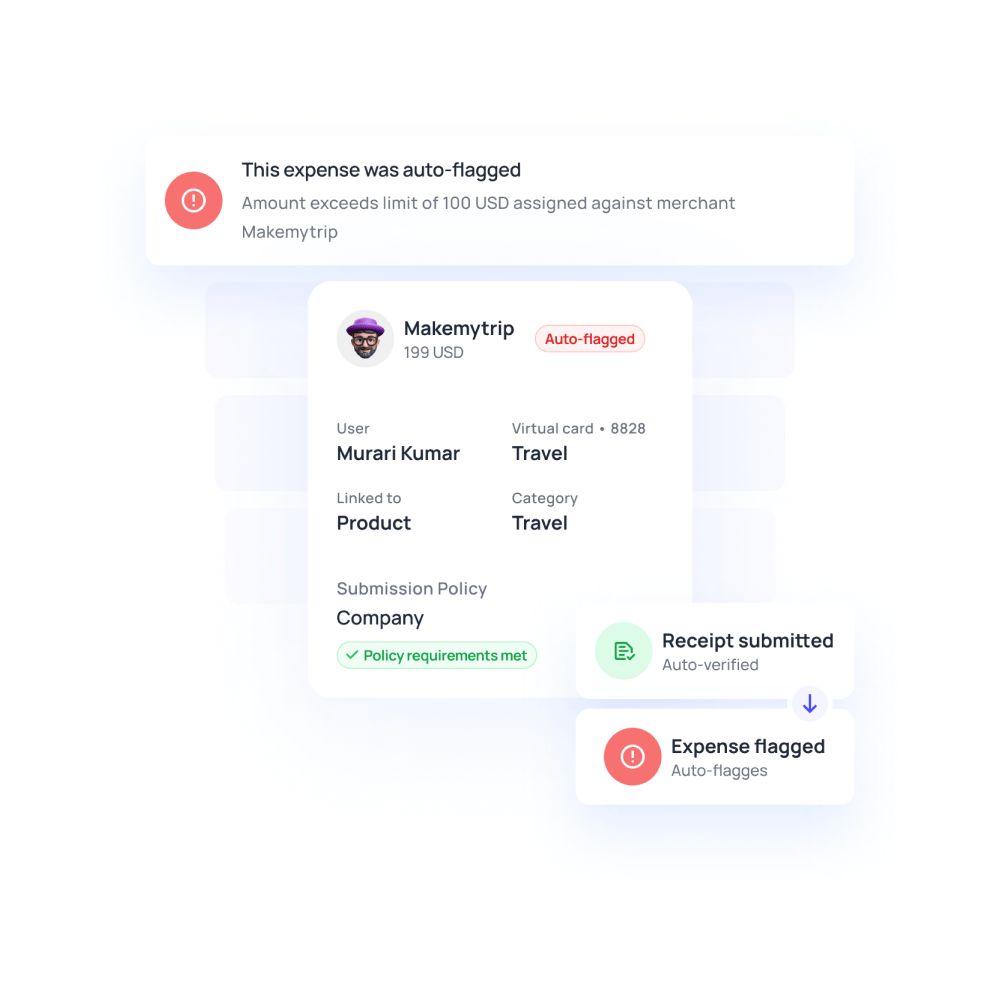P-card vs corporate card: which is best for your business
Purchasing cards (P-cards), also known as procurement cards, are physical cards issued by financial institutions to organizations for employees to make specific business purchases. These cards function like charge cards, allowing employees to make payments while automatically recording vendor details and transaction amounts in a linked system for seamless tracking.
On the other hand, corporate cards for business expenses are designed to manage a wide range of company expenditures, such as travel, entertainment, or operational costs. These cards come with features like detailed expense tracking, employee spending limits, and integration with expense management systems, making them an essential tool for organizations aiming to streamline overall expense management.
Features of corporate cards
Corporate credit cards are the finance tool for streamlining the accounts payable process. Businesses rely heavily on these cards for typical business transactions and other purposes.
● Budget linked cards
● Spend limits for individual cards
● Easy reconciliation for effective bookkeeping
● Approval requirement for high transaction value
● Real time visibility and alerts to the administrator
● It can be used for in-store as well as online purchases.
● Card for every employee and a card for every purpose

Features of P-cards
Purchasing cards were essentially created to reduce the burden of administrative and reporting processes.
● Expedited payments to suppliers
● Individual card for every employee
● It is not linked to any pre-fixed budget
● Detailed statement at the end of every month
● Spend limits for transactions above a certain amount
● Restrictions can be added for merchant categories and specific purchases.

Looking for corporate cards to manage your business expenses?
P-card benefits for businesses
P-cards are a definitive tool for an improved purchasing process. Modern day businesses are gradually moving towards purchasing cards to streamline the procurement tasks of goods and services
Enhanced controls
Maximum spending limits can be locked for each card. The limits can be set daily as well as monthly for each card. Restriction can be added for purchasing from a specific merchant category code.
Simplification of the process
P-card programs discard the traditional approach of the Purchase order or Purchase invoice. The P-card issuer has to be paid monthly for the amount exhausted for purchases, unlike the obsolete method of paying each vendor individually.
Detailed statements
P-card issuers provide an extremely granular monthly statement of the purchases made. The details include the vendor's name, transaction amount, the reason for payment, mode of payment, transaction ID, and other tracking information. Integrating this system into the accounting software can help generate accurate reports, increasing its reliability and authenticity.
Cashbacks
P-card provider allows prompt cashback payments to suppliers. The transaction costs are significantly less than other forms of payment. Prevents mishandling cash payments. Some providers grant perks through air miles and discount vouchers too.
Pros of using corporate card for your business
Though corporate cards and P-cards both allow better Accounts Payable visibility, streamlined workflow, and reliable spend reports, corporate cards seem to run the show. Here’s why corporate cards are better at reducing the friction between accounting and finance work.
Broad spectrum of spending
P-cards are tailor-made only for business expenses. These cards can be used for making payments for business purchases and other equipment. At the same time, corporate cards can be used on business trips for fare charges, hotel reservations, flight bookings, etc. A well-defined corporate credit card policy ensures that these expenses are monitored and compliant with company guidelines, enhancing financial control.
Instant statements
Expense management software displays spend analytics of each card and budget on the go. Card statements of all employees can be viewed and downloaded instantly to analyze spending behavior or check on any immediate transaction.
Business credit Line
A typical corporate card program offers a flexible credit limit to its customers. The limit is determined based on their previous Credit score. This can help raise excess capital in times of need or expansion plans. P-cards do not offer such facilities. Their functionality is limited only to making payments to vendors.
Why choose Volopay's corporate cards?
Volopay's corporate cards are designed to simplify and streamline business spending, offering enhanced control, flexibility, and security. With features like objective-specific cards, multi-level approvals, payment protection, and budget roles, Volopay ensures businesses can efficiently manage their corporate expenses while maintaining full oversight.
Here’s why Volopay’s corporate cards stand out:

Objective specific card
Volopay’s virtual cards are purpose driven. Each virtual card is created for a specific purpose, like ads, subscriptions, etc.
Funds can be loaded into these cards for a single, specific purpose only. This helps in accurately estimating the exact amount spent towards that particular objective, providing better control and transparency over expenses.

Multi level approval
A multi-level approval is established for certain transactions to keep certain transactions centralized.
If any amount above the maximum ceiling is being requested, the request will travel through all the levels of approval as selected by the company. Volopay offers a total of 5-level approvals.

Payment protection
Using visa or mastercard-backed cards is very crucial in terms of data security and protection. With their authorization, all transactions are protected from fraud, and any unauthorized activity can be flagged and reported instantly.
Additionally, all data within the Volopay system is encrypted end-to-end, safeguarding sensitive information. This added layer of protection gives businesses confidence that their transactions are secure and their funds are protected, reducing the risk of fraud and ensuring peace of mind when managing payments.

Budget roles
Card owner- All employees own their unique cards, and therefore they become card owners. The functionality of corporate card owners is limited only to requesting funds and making payments.
Budget owner- Budget owners are responsible for creating the budgets. They have access to all the corporate cards attached to their budgets and hence, they can load, unload funds, freeze or block cards and create new cards. Admin- The admin is superior in the hierarchy. He can perform all the functions of a card owner and a budget owner.








Trusted by finance teams at startups to enterprises.